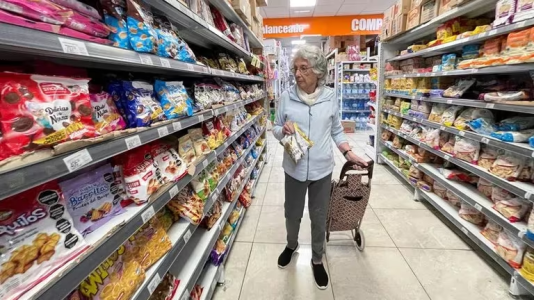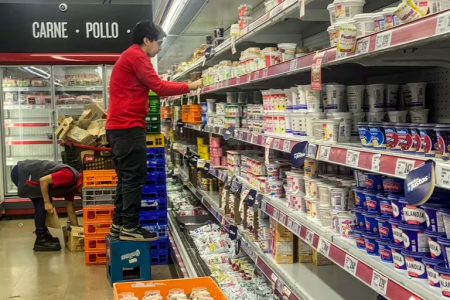All the Answers
Well-known member
Mass consumption continues to plummet: sales in supermarkets fell 8% in February and the trend continues in March - Infobae

Source:

El consumo masivo sigue en picada: las ventas en supermercados cayeron 8% en febrero y la tendencia sigue en marzo
Los consumidores se vuelcan a productos sustitutos más baratos y que rinden más que otros. Las compras son cada vez más frecuentes y con tickets más pequeños. Cuánto tardarán en verse más productos importados en las góndolas
March 19, 2024
Consumers turn to cheaper substitute products that perform better than others. Purchases are becoming more frequent and with smaller tickets. How long will it take to see more imported products on shelves?
By Agustin Maza

Mass consumption continues to decline. REUTERS/Agustin Marcarian
Mass consumption continues in clear decline due to the impact of the loss of purchasing power of income that has deepened in recent months, in the midst of the dispute initiated by the Minister of Economy, Luis Caputo , over promotions and greater flexibility to import products. of the basic basket .
In February , supermarkets had a drop in unit sales of around 8.3% compared to the same month last year. The week from March 4 to 10 showed a decline of 9% year-on-year. The greatest influx of imported items will take at least one to two months to be noticed on the shelves.
The information arises from preliminary data from the consulting firm Scentia accessed by Infobae and consultations made by this medium in the supermarket sector. In January the drop in sales had been 8.3% year-on-year. Marketers and mass consumption production companies expect this trend to continue at least until mid-year.

Caputo insists that companies stop promotions and lower their list prices. (Nicholas Stulberg)
The sources pointed out a trend that began to deepen in recent months: consumers are looking for cheaper substitute products or that perform better than others . “The sale of milk powder grew considerably . People buy less dairy desserts and more butter, fewer snacks and more pureed tomatoes, tuna fell and mackerel grew, air deodorant is sold less,” they detailed.
This is in addition to other changes in habits that had started a long time ago but that grew after the impact of the devaluation that the Government of Javier Milei applied last December. The increase in the price of local products in dollars made shopping in border cities no longer more convenient for foreigners. In addition, there is a greater frequency of purchase and a smaller number of units per ticket , with the aim of taking better care of “the pocketbook” every time they go to the supermarket.
In this context, the Government accelerates the greater flexibility of imports for products in the basic basket. On Friday the Central Bank published the communication that allows importers of these items to pay within 30 days. This Monday the Afip suspended the collection of Income Taxes and VAT for 20 consecutive days , a measure that goes in the same direction.
Supermarkets consider that the greatest influx of imported products will be noticed on the shelves within a period of one or two months, for business and logistical reasons. The largest amount of merchandise, they said, could come from Brazil due to its proximity and scale of production.

Consumers turn to cheaper or higher performing products. EFE/ Juan Ignacio Roncoroni/Archive
In parallel, Caputo is betting that companies leave aside “2x1″ or “3x2″ promotions and lower the prices on their lists. A discussion more about level than price variation. The official assured in the meetings that he held in recent weeks with supermarkets and mass consumption companies that there will not be a sudden devaluation in the official exchange rate.
The expectation that the 2% monthly growth rate in the official dollar will be maintained is key so that prices do not overheat and the Government can sustain the slowdown in inflation from 25.5% last December, when there was a 118 percent jump. The decrease reached 13.2% in February but March predicts the possibility that the decline will end due to the seasonality of the month.
In any case, production companies now not only take into account the hedging process but also at what prices they can sell their products in a context of sharp decline in consumption. Businessmen expect the decline to be felt at least until June and are betting on a second half of “rebound . ” But they know that the key will be what happens with the Government's macroeconomic program and the purchasing capacity of consumers.

